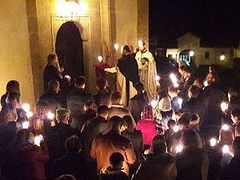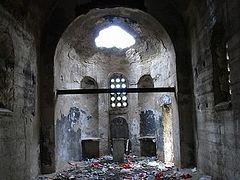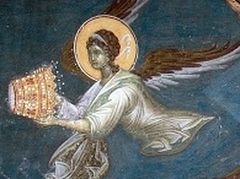The following homily was given by Abbot Ilarion (Lupulovic) of Draganac Monastery in Kosovo at the Gračanica Cultural Center after Liturgy on the feast of the Nativity of the Mother of God. However, his homily is not focused solely on the feast, but rather, his words apply to all Orthodox Christians at all times.
 The face of the Most Holy Theotokos. Fresco from Gracanica Monastery, Kosovo, Serbia, c. 1320. Photo: fotoload.ru
The face of the Most Holy Theotokos. Fresco from Gracanica Monastery, Kosovo, Serbia, c. 1320. Photo: fotoload.ru It is truly a great joy when we feel how beauty triumphs over meaninglessness and the pressures which we are presented with every day, since the world lies in wickedness (1 Jn. 5:19). Christians should be the salt of the earth, they should give meaning to all that exists, but of course, this is not something which we can do of our own strengths. Although sinful, Christians bear witness to an experience which transcends themselves. They bear witness to the mystery of the living God, the most beautiful among the sons of men (Ps. 44:3), Who is truly present among us when we gather together in His Name. We did precisely this today in holy Gračanica. We prayed to God and we confirmed our communion with each other: children and adults, monastics and lay people. We then took the blessings of the holy altar out into the streets of Gračanica with the desire to bring the joy of eternal life to the alleys, orchards, through the school yards, into the squares, witnessing to the existence of a single Truth, of a higher reality which is unchangeable and constant.
There are many kinds of truths, particular truths. Some people say that something is true for one person while for another it is not. Christians believe that Christ is the truth, and that Christ is present wherever two or three are gathered together in His Name. We could even say then that the truth is the experience of mutual communion, freedom, love, respect for others and accepting that we carry one another’s weaknesses, since we are all sinners, everyone in their own way. A Christian is someone who is ready to let another person, with all of his weaknesses, into his own being, knowing that because he has accepted someone else, he will receive far more than he will have to endure. Everything that the Christian does is based on his hope in God’s enormous power, a power which leads from death to life. God’s power cures diseases. God’s power, paradoxically, does what is impossible. The reality of the Kingdom of Heaven begins when we stop calculating, doing statistics, playing number and word games, analyzing, dividing, and dissecting. The life of the Church begins when we enter into a deeper experience that unites us together.
I would like once again, on behalf of our bishop, to call you to unity, to the unity of the eternal truth that we experienced today at the Divine Liturgy in holy Gračanica.
It is exceedingly difficult for us to exist, especially in this place, if we do not understand the life of the Church, if we do not feel the pulse of the Church, if we do not listen to the voice of the Church. The voice of the Church is not the voice of a single man, but rather is the truth and wisdom that manifests itself in the assembly of the saints, in the holy episcopal assembly that leads our Church. There is no one single man who is the absolute authority or who leads on his own. The only authority we recognize is the assembly gathered together around Christ. Wisdom is in the counsel of many, and this is an experience which the Church witnesses to even just in how it exists. Even back in the time of ancient Israel, powerful leaders were very careful, even if they did not agree, to pay attention to what those who served God said. While some would repent and change their ways, unfortunately, the majority of them persecuted the prophets in the end.
Today, we must listen to and hear one another. The Holy Church of God is one of the most basic foundations of our identity as a people. The medieval period of Serbian culture did not leave behind castles and palaces for us today, but monasteries and holy places. These are not dead cultural monuments, but rather they are the pulsating dwelling places of the saints, because people still live in them and pray in them, becoming themselves a part of that heritage and giving life to the stones, becoming one with their forefathers though the Divine Liturgy, which gives us eternal meaning. These places bear witness to the Kingdom of Heaven which is revealed to us at every Divine Liturgy, whether it is served in Belgrade or in Gračanica, Prizren, Đakovica, Uroševac, or Gnjilane—which demonstrate that Kosovo and Metohija are still Serbian. When you look at Gračanica or Visoki Dečani, you have no doubt that Kosovo and Metohija bear the clear mark of Serbia. Of course, this does not mean that they cannot also belong to someone else, or that there is no room for someone else’s culture and experience. At the same time, in any case, we must not despise the church bells which still ring in Đakovica, Prizren, or Gnjilane. The sound of church bells opens up the Heavens to us, giving consolation and eternity to our existence, and returning us to the truths of the Gospels. They give us strength to exist in such a fearsome place, to be diligent and to have a recourse, but above all, to exist in a place that is so often so difficult and fearful.
Thanks to God’s power and strength, the Serbian people have remained in this region. We can thus find many reasons for optimism. In the region of Kosovo in which I live, the local people refer to “the sweet church” and “sweet God,” by which they mean: “Whatever happens, we are with the Church.” This is a part of the Serbian people’s spiritual code.
Throughout history, monastics were in many instances of key importance to the fate of the Serbian people, raising their voices in critical moments.
In more recent times, one “voice crying out in the wilderness” was that of St. Justin Popović, who criticized the repressive totalitarian regime of Communist Yugoslavia. His voice struck fear into those who were in power at the time. Even though he was constantly under surveillance, today we know that he is the voice of truth, a truth that he confessed and for which he endured a time of great tribulation, while we no longer remember those who listened in on him and persecuted him. Father Justin is someone upon whom we must reflect now, with all that is going on around us. He was, in large part, the greatest spiritual authority that could help to rebuild our Church in the post-communist period and who could restore our people to wholeness. We must ask ourselves, “Why is this man in black crying out?” What could drive someone who has renounced the world, who dedicated his youth to God, to cry out like John the Baptist, Repent and believe in the Gospel (Mk. 1:15)?
I will speak to you only what is true; I confess the truth to you for God’s sake. Even though I was not born in Kosovo and Metohija, when I first saw Dečani and Peć, I knew that this is my homeland. Dečani’s other-worldly beauty drew me in, and I stayed to live there. I am not the only one. One monk came from Belgrade, another from Užice, another from Trebinje; we all came for the same reason, with the same motive, one which exceeds any kind of rational explanation. With the decisions that we made, despite our limitedness and our weaknesses, eternity prevails. Through the prayers of our priests and monastics, through the dedication of our people and the joy which we have maintained in spite of all of the hardships, the power of Christ prevails. This power gives us strength and optimism to know that everything can be overcome, that everything will pass in time, all of the misunderstandings that we are victims of.
On this blessed day, on which we prayerfully remember the Mother of God, who chose the better part (Lk. 10:42), as it is written in Holy Scripture, we must believe and know that what is impossible is actually quite possible. We must not abide by our rational minds alone, for this mind gives birth to an analysis which does nothing but divide, cut up, and put things into orderly, labeled categories. No, rather, our decisions must be based on a deeper experience, an experience based on synthesis, gathering, and assembling. Dostoyevsky said that the rational mind is only twenty percent of a man. The mind is only a small part of our experience, and this is why we cannot base our decisions on statistics alone.
In the present context, it would be helpful to remember the story from the Bible about King Solomon’s wisdom. Probably, most of you already know what Solomon’s solution was in the situation involving two women who came to him with one of the women holding a child. The other woman said that the child was hers. She said that the woman holding the child had taken her child after her own child had died. So, one of the women said, “The child is mine,” while the other said the same. Solomon arrived at a decision, saying, “Divide the child! One half will go to one woman, and the other half to the other woman.” At that moment, the true mother said, “No! Just don’t cut it up, just let it live!” And then Solomon said, “This one is the real mother,” and gave the child to her.
Patriarch Pavle of blessed memory said that this story is symbolic of two ways of existing, of deciding. One springs forth from reason, which is analytical, which divides, reasons, and judges, while the other comes from a deeper, supra-rational experience which springs forth from love, the deepest mystery of existence. We must carefully listen to one another, because this life passes by quickly, while the Truth is eternal and our conscience and image will remain on to stand judgment before God.
In the coming days, let us pray to the Mother of God to give us all strength, so that with our common strengths we would bear witness to joy, to faith that the future will be better than the present. It will turn out this way only if we truly want it, only if we truly believe in it. In such a future, there is a place for all people of good will, among whom there are people who came from abroad and who honestly desire to help us. We also see here with us today representatives of KFOR,1 who have protected our churches and monasteries and whose presence here is of great importance. We are so thankful to them for all they have done so that we can remain here and survive this difficult and uncertain time. Also present with us are representatives of various foreign diplomatic missions, their Excellencies, among whom there are many true friends who want to help us, and for this we thank them.
May the Mother of God protect us all under her omophorion and may she give us all joy in our hearts, so that we can say that everything is good and that with God’s help, everything will be better.
Thank you!
Learn more about Draganac Monastery at its new website!



